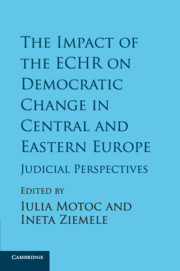13 results
22 - Conclusions
-
-
- Book:
- The Impact of the ECHR on Democratic Change in Central and Eastern Europe
- Published online:
- 05 August 2016
- Print publication:
- 18 August 2016, pp 491-501
-
- Chapter
- Export citation
Index
-
- Book:
- The Impact of the ECHR on Democratic Change in Central and Eastern Europe
- Published online:
- 05 August 2016
- Print publication:
- 18 August 2016, pp 502-529
-
- Chapter
- Export citation
Foreword
-
- Book:
- The Impact of the ECHR on Democratic Change in Central and Eastern Europe
- Published online:
- 05 August 2016
- Print publication:
- 18 August 2016, pp xxv-xxviii
-
- Chapter
- Export citation
Contents
-
- Book:
- The Impact of the ECHR on Democratic Change in Central and Eastern Europe
- Published online:
- 05 August 2016
- Print publication:
- 18 August 2016, pp v-v
-
- Chapter
- Export citation
Table of cases
-
- Book:
- The Impact of the ECHR on Democratic Change in Central and Eastern Europe
- Published online:
- 05 August 2016
- Print publication:
- 18 August 2016, pp xiii-xxiv
-
- Chapter
- Export citation
Contributors
-
- Book:
- The Impact of the ECHR on Democratic Change in Central and Eastern Europe
- Published online:
- 05 August 2016
- Print publication:
- 18 August 2016, pp vi-xii
-
- Chapter
- Export citation
Copyright page
-
- Book:
- The Impact of the ECHR on Democratic Change in Central and Eastern Europe
- Published online:
- 05 August 2016
- Print publication:
- 18 August 2016, pp iv-iv
-
- Chapter
- Export citation

The Impact of the ECHR on Democratic Change in Central and Eastern Europe
- Judicial Perspectives
-
- Published online:
- 05 August 2016
- Print publication:
- 18 August 2016
Contributors
-
-
- Book:
- Sovereignty, Statehood and State Responsibility
- Published online:
- 05 February 2015
- Print publication:
- 12 February 2015, pp viii-x
-
- Chapter
-
- You have access
- Export citation
15 - Room for ‘State continuity’ in international law? A constitutionalist perspective
- from Part II - Statehood
-
-
- Book:
- Sovereignty, Statehood and State Responsibility
- Published online:
- 05 February 2015
- Print publication:
- 12 February 2015, pp 273-284
-
- Chapter
-
- You have access
- HTML
- Export citation
Contributors
-
-
- Book:
- Nationality and Statelessness under International Law
- Published online:
- 05 October 2014
- Print publication:
- 18 September 2014, pp vii-xii
-
- Chapter
- Export citation
9 - State succession and issues of nationality and statelessness
-
-
- Book:
- Nationality and Statelessness under International Law
- Published online:
- 05 October 2014
- Print publication:
- 18 September 2014, pp 217-246
-
- Chapter
- Export citation
The European Union as a Global Actor in a Multipolar World
-
- Journal:
- Proceedings of the ASIL Annual Meeting / Volume 107 / 2013
- Published online by Cambridge University Press:
- 20 January 2017, pp. 183-185
- Print publication:
- 2013
-
- Article
- Export citation



